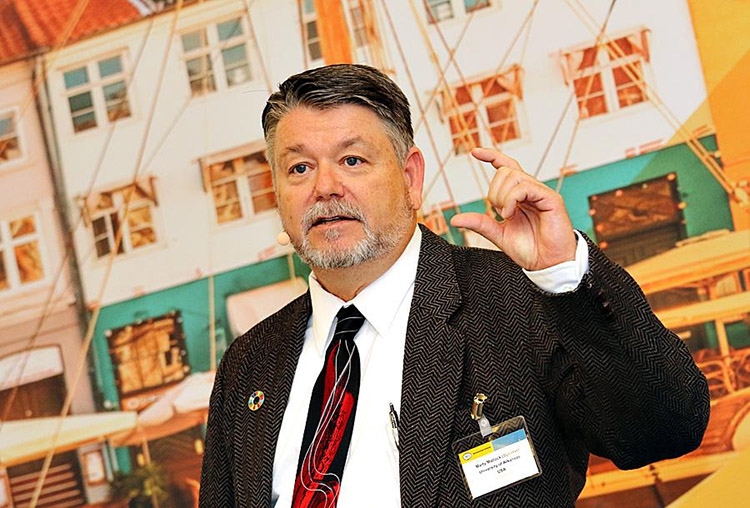
FAYETTEVILLE, Ark. – The message is clear: Reducing climate change is the challenge of this generation. Marty Matlock, executive director of the University of Arkansas Resiliency Center, delivered this message last week at events in Copenhagen, Denmark, and Leon, Mexico.
The U of A Resiliency Center is an interdisciplinary research, education and outreach collaboration hosted by the Fay Jones School of Architecture and Design, in collaboration with the Sam M. Walton College of Business and the College of Engineering at the university.
Matlock is a professor in the Department of Biological and Agricultural Engineering in the College of Engineering. He was invited to provide keynote presentations at the International Egg Commission in Denmark and at the Global Agricultural Forum in Mexico. His message was simple: Humans must return balance to the planet's carbon cycle, and agriculture can play a major role in accomplishing this task.
Agricultural practices, some old and some new, can return carbon from the atmosphere to the soil, enhancing soil health and reducing climate impacts. Improving nitrogen management through precision application of fertilizers and expanding use of manure for fertilizers can reduce climate impacts. Both of these strategies also improve soil health by increasing soil carbon and soil water capacity and by decreasing erosion.
These are the findings of the Resiliency Center research program, led by Greg Thoma, a professor in the Department of Chemical Engineering. Thoma's global team of scholars is investigating methods and strategies for reducing greenhouse gas emissions from across agricultural systems, including fruits and vegetables, grains and animal proteins.
Matlock made it clear that the United Nations Sustainable Development Goals cannot be achieved without addressing climate change. These 17 goals clearly define the interconnected challenges facing humanity, and include ending hunger, providing clean water to people, and protecting life on land and in water.
These sustainable development goals are the foundation of the university's Sustainability Minor, led by David Hyatt, an associate professor of supply chain management in Walton College.
"I am proud of our community's commitment to civil discourse on climate change, and fully support the activism of our students, staff and faculty on Sept. 27," Matlock said. "This is the form of collective action that will be necessary to change policies and change our economy to climate neutrality."
Finally, Matlock shared the work of the U of A Community Design Center, directed by Steve Luoni, on the challenges of food security and community resiliency. The staff of the center, also in the Fay Jones School of Architecture and Design, partners with the Resiliency Center's team to rethink food supply chains from rural to urban, local to global. This work includes Food City, an exploration of a food-sustainable urban system funded by the National Endowment for the Arts and the Clinton Global Initiative, and Feed Hawaii, a comprehensive strategy for sustainable food production on the neighbor islands of Hawaii, funded by the Hawaii Department of Agriculture.
Luoni is also a Distinguished Professor and the Steven L. Anderson Chair in Architecture and Urban Studies in the Fay Jones School, and he is the design director for the Resiliency Center.
The focus of the U of A Resiliency Center is to explore and engage the challenges of resiliency of food, water and community systems. The center's office is located with the Community Design Center in the Pryor Center building on the downtown Fayetteville square.
Topics
Contacts
Marty Matlock, executive director
U of A Resiliency Center
479-575-6712, mmatlock@uark.edu
Michelle Parks, director of communications
Fay Jones School of Architecture and Design
479-575-4704, mparks17@uark.edu